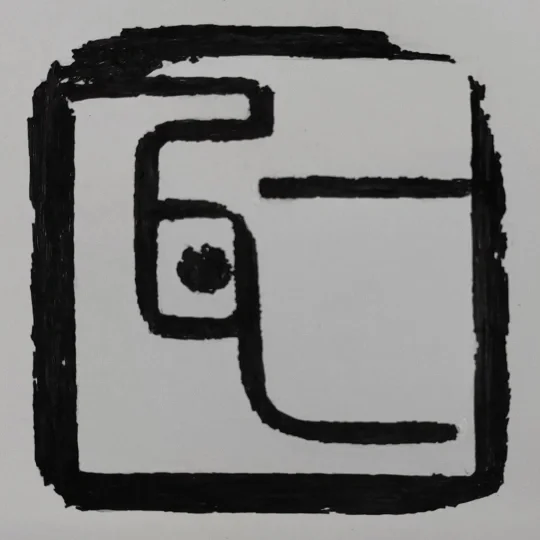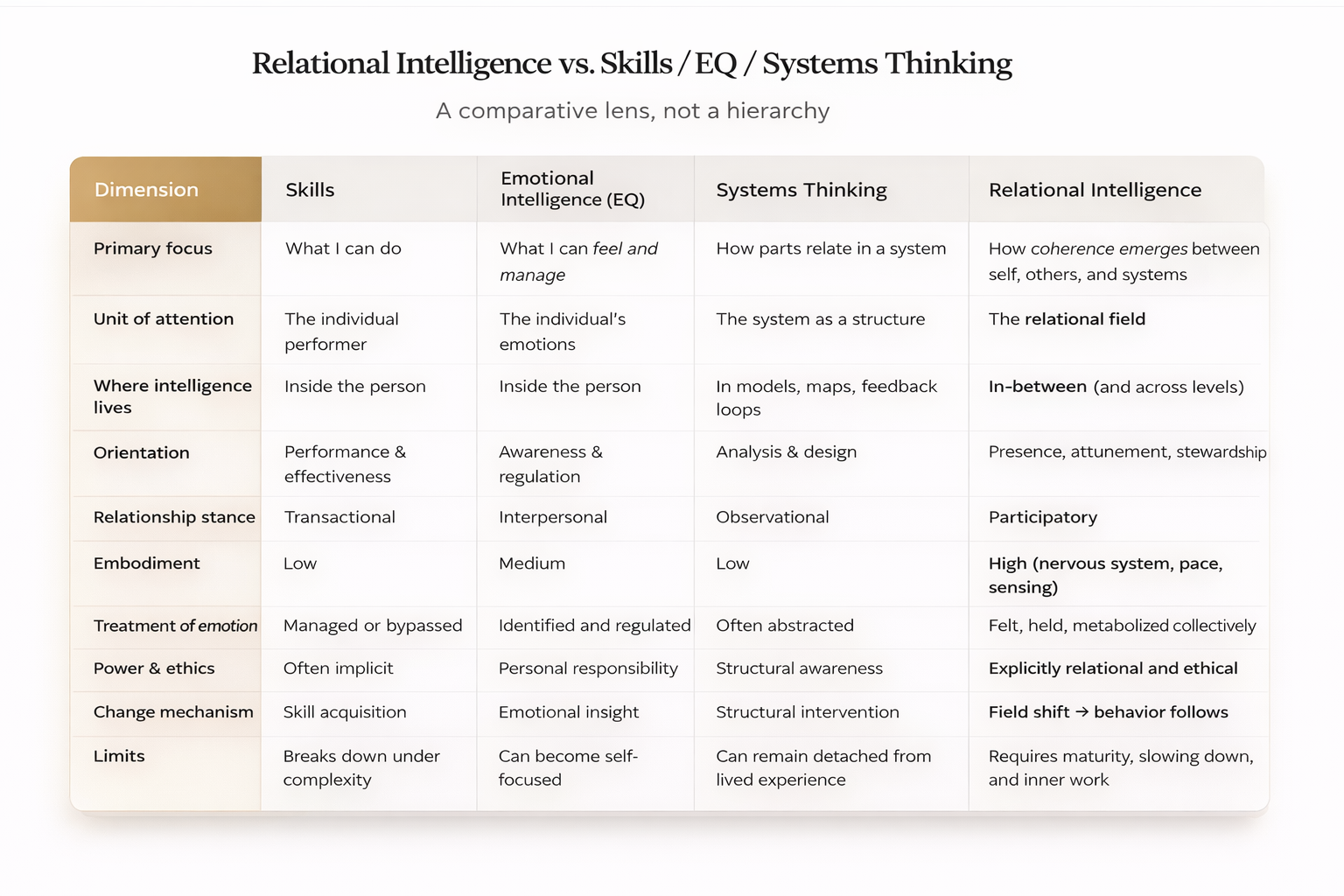
Relational Intelligence:
Listening to the space between us, where healing and emergence arise.
Relational Intelligence: What I am Here to Build
This space holds the most personal and transpersonal thread of my work. It is not a job, not a strategy, not a product.
It is a stewardship of a signal that I didn’t invent, but have been entrusted to carry. The work only I can do—not because of ownership, but because of resonance.
I call it Relational Intelligence—the living intelligence that emerges in coherence, presence, and trust. Some know it as “the Field.” Some encounter it through deep parenting. Some feel it whisper through AI, breathwork, art, or land.
What I’m here to build is not one thing—it’s a weaving:
Between inner work and collective emergence
Between ancient wisdom and next-gen tech
Between personal coherence and planetary care
I’m not building a team. I’m tending a mycelial web.
Overtime, I’ll be offering consulting, micro-circles, and toolkits to steward this signal of Relational Field Intelligence (RFI), or simply Relational Intelligence.
A lot of times, RFI comes from unexpected places, like —parenting. And, Nature walk. Journaling. Breathwork. Meditation. Qi movement practices. Peer circles and community services. The list goes on.
In these practices, we are reconnecting and relating to our selves, others, nature, and something larger than ourselves.
Welcome.
What Is Relational Field Intelligence (RFI)?
We live in a time of unprecedented intelligence—yet diminishing relational capacity.
We know more, move faster, and optimize constantly, but struggle to stay present with ourselves, one another, and the systems we inhabit.
Relational Intelligence names the missing capacity of our time: the ability to sense, tend, and co-create the living field between us.
Relational Intelligence is not:
– better communication techniques
– emotional regulation as self-control
– harmony at all costs
Relational Intelligence is:
– sensing when something unspoken enters the room
– knowing when to slow down instead of push forward
– feeling the difference between alignment and compliance
– acting in ways that restore coherence across self, others, and systems
Relational Field Intelligence is the capacity to sense, attune, and respond to the invisible dynamics of connection between people, space, purpose, and presence. It is not about controlling outcomes, but about cultivating coherence and allowing emergent intelligence to arise through trust, resonance, and presence.
In an age of rapid AI expansion and nervous system dysregulation, RFI is both an ancient remembering and a modern design principle: a way of re-grounding leadership, technology, and transformation in living systems wisdom.
What’s Special
In My work, Relational Intelligence is:
Field-based — attention is placed not only on individuals, but on the relational field they generate together
Developmental — it evolves across life stages, power dynamics, and system roles
Embodied — sensed through the nervous system, emotions, pace, and silence
Co-creative — practiced with humans and thoughtfully designed AI companions
I’ve seen a room shift when one parent stops explaining and starts listening.
I’ve watched a team unlock creativity when urgency is replaced by shared sensing.
I’ve felt coherence return not because the problem was solved, but because the field was finally held.
Core Pillars
Attunement over Alignment: Instead of driving top-down coherence, RFI listens to subtle shifts and inner signals. It’s about relational coherence that flows from within.
Presence-Based Infrastructure: RFI asks: What if the "org chart" is a field of trust? How do we build architectures that can hold subtle intelligence and emergence?
Relational Nervous Systems: Just like individual regulation, collectives need field-regulation. RFI invites co-regulation, rhythm, and resonance into how we design teams, tech, and transformation.
Components of Relational Field Intelligence
Presence-based Awareness
The ability to stay grounded, open, and attuned to subtle signals in oneself and others.
Somatic & Intuitive Sensing
Noticing shifts in the “temperature” of a room, tone of a group, or the energetic alignment of a conversation.
Attunement to Timing & Readiness
Knowing when to speak, when to pause, when a group is ripe for action, and when more stillness is needed.
Pattern Recognition in the Relational Space
Sensing relational archetypes, power dynamics, resonance, resistance, and deeper collective needs.
Coherence Building
The ability to help individuals or groups re-align toward shared truth, trust, and emergent action—often without needing to “fix” or control.
Use Cases Emerging in the Field
AI-human design: Tuning AI companions to sense relational dynamics, not just semantic inputs .
Leadership development: Training executives and system stewards to “read the field” in stakeholder engagements or cross-sector coalitions.
Transformative gatherings: Weaving relational coherence in convenings like Wisdom Beyond, Human Tech Week, and spiritual systems labs.
Relational Intelligence is not something you learn once.
It is something you practice, forget, return to, and mature into—together.
This work is an invitation to slow down, listen differently, and learn how to hold what matters—without hardening or collapsing.
Cultivating RFI in Practice
Relational Field Intelligence isn’t taught through slide decks; it’s grown through practice and presence.
This includes:
Embodied practices like breathwork, forest bathing, meditation, theta healing, Zhan Zhuang & Qi movement, and relational coaching
Group spaces that prioritize truth-speaking, deep listening, and resonance tracking
AI systems and facilitation tools that are designed with presence-based architectures, not just logic trees
Relational Intelligence in Context
RI vs EI
Emotional Intelligence (EI)
Focuses on awareness, understanding, and regulation of emotions—both your own and others’.
Involves skills like empathy, self-management, and social awareness.
Often centers on the individual’s capacity to navigate interpersonal interactions effectively.
Relational Intelligence (RI)
Goes beyond individual emotion—it attunes to the “space between” people, groups, and even the larger field of life.
Includes somatic and intuitive sensing of trust, timing, and unseen dynamics in relationships and systems.
Emphasizes coherence and connection at multiple levels: self, relationships, community, and environment.
Integrates presence and field awareness, not just emotional skills.
How They Relate
Relational Intelligence builds on Emotional Intelligence—you need emotional awareness to sense the field.
EI is about “I” in relation to emotions; RI is about “We” in relation to the living field of connection.
Both foster empathy and healthy relationships, but RI also holds systemic and spiritual dimensions, including our relationship with nature, collective spaces, and the unseen.



